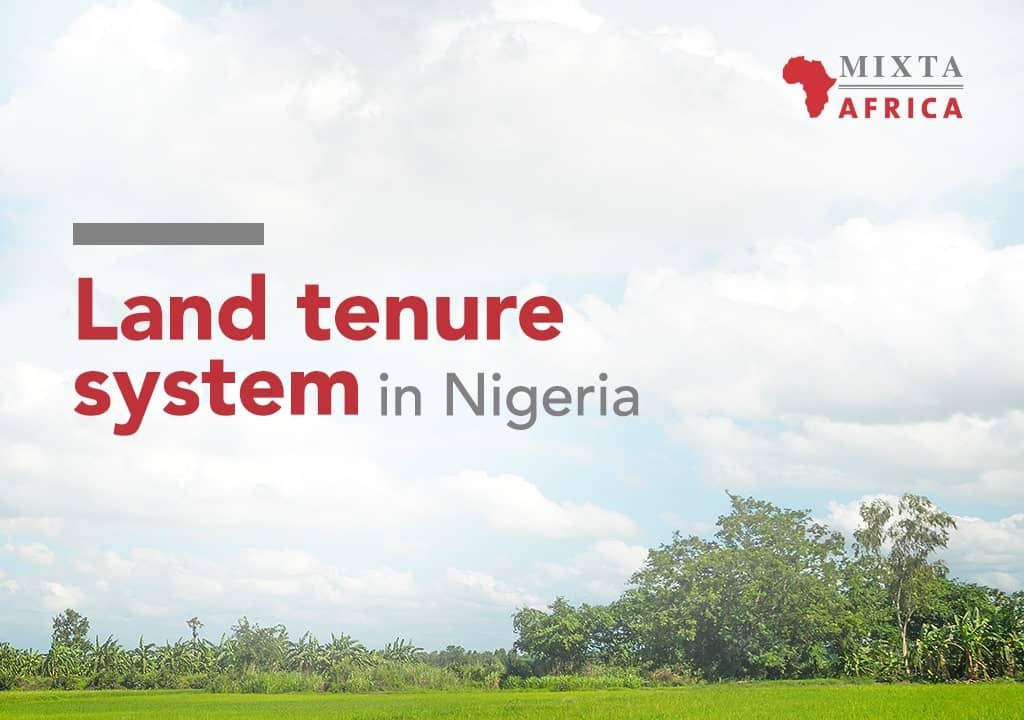A land tenure system is a set of rules and regulations that govern how land is owned, used, managed, and transferred within a society.
These systems act as the foundation for regulating land ownership rights, establishing who can use the land, for how long, and under what conditions.
The land tenure system in Nigeria is a global subject matter and with it, has come the need to discuss how to go about owning land in Nigeria.
This article will open a conversation about the regulations of land ownership in Nigeria so that we know the various forms of land ownership behavior in the country.
What is the meaning of Land Tenure System?
About Land Tenure System in Nigeria
7 types of Land Tenure System in Nigeria
3.Communal Land Tenure system:
7. Tenants at Government Will:
How you can become a landowner
What are the features of land tenure system in Nigeria
Advantages of land tenure system in Nigeria
Disadvantages of land tenure system in Nigeria
What is the Land Tenure System?
The Land Tenure System in Nigeria is the process of granting ownership of land to individuals, legal bodies, corporate bodies, and natural bodies based on their use of these lands.
This statutory instrument is used to ensure that human habitats are safe and sustainable.
Furthermore, the Land tenure or Land administration system in Nigeria is an institution of laws that can regulate the use, management, and transfer of land.
About Land Tenure System in Nigeria
Land tenure system in Nigeria is an important issue of discussion, search, and review. The basic land law regimes and determinants of relevant rights and obligations concerning land property.
Land tenure in Nigeria is a complex series of relationships between multiple institutions concerning the uses of land.
It also includes institutions that are significant in determining the pattern of land ownership and use. These institutions include the government, customary laws, etc.
More so, the history of land administration in Nigeria can be traced back to the 1800s while some statistics show that only a smaller percentage of the nation’s urban residents live in officially designated urban areas.
Other people seek ways to own or buy land in their vicinity.
7 types of Land Tenure System in Nigeria
To strengthen property rights and eliminate systemic sources of wealth inequality by changing the classification, distribution, and administration of its land resources, the country came up with types of Land Tenure systems. They are:
1. Freehold Tenure System:
Individuals who subscribe to the Freehold tenure system pay a predetermined amount for the right to own a plot of land. Upon obtaining it, you can use it as collateral for a loan. The larger the land, the greater the payment. The land is surveyed and closed by signing backup documents.
2. Inheritance Tenure System:
In this case, land ownership is transferred to the next of kin. Thus, lands are provided for both born and unborn children. Some villages transfer lands to the children upon their parents’ death.
3. Communal Land Tenure system:
The community becomes the ruling power of the land under this system. The head of the community determines the sharing ratio. Farming on a large scale is often encouraged, but a single individual cannot claim ownership of the land or even use it as security.
4. Leasehold Tenure System:
An individual is granted temporary ownership of a plot of land by some form of a title from the owner. During the lease period, an individual may have temporary access to the land, but cannot use it as collateral for loans.
5. Gift Tenure System:
This type of land ownership is when the landowner gives up his or her land voluntarily and without being coerced by anybody. Since the new owner now owns the full and permanent title to the land, he can use it as collateral for a loan.
6. Rent Tenure System:
The tenants pay a rent amount to the landlord for the time that they use the property. Depending on the agreement and terms, the rent period could be one to two years.
7. Tenants at Government Will:
According to this system, land is leased by the Nigerian government to farmers for cultivating. The land is mostly used for large-scale farming and crop production. The land is relatively inexpensive to acquire.
Advantages of land tenure by Inheritance in Nigeria
Here are the advantages of land tenure by inheritance:
-
Security and Stability: Inheritance tenure provides a sense of security for families. Families can keep their land for future generations.
-
Reduced Land Disputes: Clear inheritance rights help families and communities avoid arguments.
-
Promotes Long-Term Investment: Landowners may be more likely to invest in and improve the land if they know it will be passed on to their heirs.
- It is backed up by “Acts” and these acts provided for all issues at or about lands in Nigeria, its ownership, descriptions, partition use, inheritance, mortgage purchase/ selling transfer, etc.
For more information about the land system in Nigeria, check out my guides:
Proof of Land Ownership in Nigeria
Disadvantages of Land Tenure System by Inheritance
While inheritance offers a sense of security and stability for families, there are also some drawbacks to consider:
- Land Fragmentation: When land is divided amongst multiple heirs, it can become fragmented into smaller and smaller parcels over generations. This can make it difficult to use the land for large-scale agriculture or development projects.
- Disputes and Delays: Inheritance can sometimes lead to disagreements among family members about who should inherit the land or how it should be divided. This can result in lengthy legal battles and delays.
- Limited Access to Credit: Land inherited through inheritance may not be readily usable as collateral for loans since ownership can be unclear or disputed. This can hinder investment and development on the land.
How you can become a landowner
You can become a landowner by inheritance or by other existing types of land tenure systems discussed in this article.
More so, Mixta Africa, a team of innovative minds working towards building interconnected African cities and spaces can also help you out.
What are the features of land tenure system in Nigeria
The things that make up the Land Tenure system in Nigeria include:
- Property right by an individual
- Use of land within a community
- Control of communal piece of land and
- Transfer of allocated piece of land legitimately.
Conclusion:
Land tenure is a system of laws that determines who is considered to be the owner of land in a given jurisdiction.
Nigeria has a federal system of government and land tenure laws are generally made by the various States. This topic often creates attention in the country the “Land Tenure System”.
Therefore, in an attempt to explore further, we have conducted some research on land tenure in Nigeria.
Our findings were elaborated on in this article so that it will contribute to the numerous debates about the land tenure system in Nigeria.












